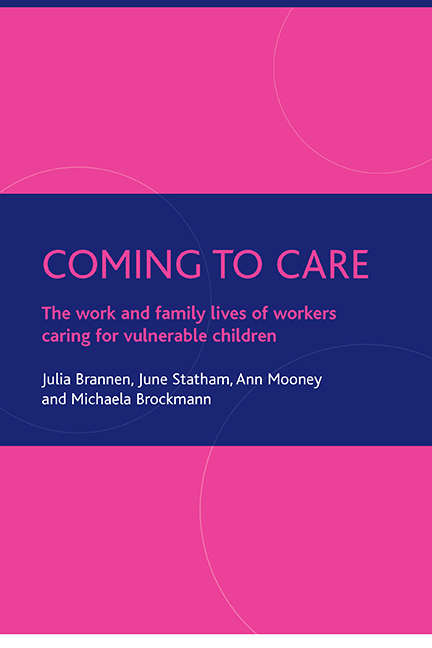Book contents
- Frontmatter
- Contents
- List of tables and boxes
- Acknowledgements
- one Setting the scene
- two The study
- three The origins of a care ethic in care workers’ childhoods
- four Entering care work with vulnerable children
- five Care workers’ careers and identities: change and continuity
- six What do vulnerable children need? Understandings of care
- seven Experiences of care work
- eight Leavers, movers and stayers
- nine Managing care work and family life
- ten Conclusions and policy implications
- Appendix: Boxes and additional tables
- References
- Index
four - Entering care work with vulnerable children
Published online by Cambridge University Press: 15 September 2022
- Frontmatter
- Contents
- List of tables and boxes
- Acknowledgements
- one Setting the scene
- two The study
- three The origins of a care ethic in care workers’ childhoods
- four Entering care work with vulnerable children
- five Care workers’ careers and identities: change and continuity
- six What do vulnerable children need? Understandings of care
- seven Experiences of care work
- eight Leavers, movers and stayers
- nine Managing care work and family life
- ten Conclusions and policy implications
- Appendix: Boxes and additional tables
- References
- Index
Summary
Introduction
Making sense of people's lives and the stories they tell is a complex task. As described in Chapter Two, in the case studies we teased out the ‘biographical facts’ of care workers’ lives and the contexts in which their lives were lived from the interpretations they provided as interview informants. Both the accounts of interviewees and the way we as researchers analyse them are multilayered. In this book we have disentangled accounts about the origins of their orientations to care (Chapter Three) from those events and circumstances that relate to their entry into care work (this chapter), and distinguished these from the orientations and identities that developed in the course of their careers in care work (Chapter Five).
The decision to work with vulnerable children by the four groups of workers in this study is an occupational decision to enter one type of work rather than another. We have identified the points in the lifecourse when they first entered care work with vulnerable children and young people, although, as many of these cases show, these workers also worked first in other types of care work. In the Postal Survey we were not able to explore care workers’ work careers nor to discover the points in the lifecourse when they undertook training. It was not feasible to collect such detailed data while data on post-school qualifications related to care work are difficult to collect since there are so many post-school qualifications and we could only offer a limited number of options on the questionnaire.
In this chapter, drawing exclusively upon the case studies, we also address the question of why informants entered care work with vulnerable children when they did. We explore their reported decisions in relation to past events and circumstances while recognising and taking into account that these accounts are located in present time and current experience. Such precipitating events are sometimes momentous while often they are predictable or mundane such as the need to find another job or a person's suggestion to enter care work. Four broad themes are identified. These themes are not mutually exclusive, in some instances with several factors featuring in a given case. Table 4.1 gives an overview across the four groups.
- Type
- Chapter
- Information
- Coming to CareThe Work and Family Lives of Workers Caring for Vulnerable Children, pp. 59 - 76Publisher: Bristol University PressPrint publication year: 2007



